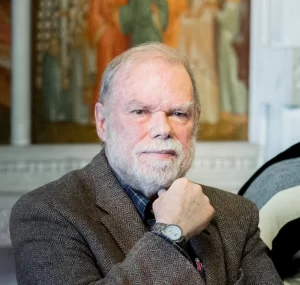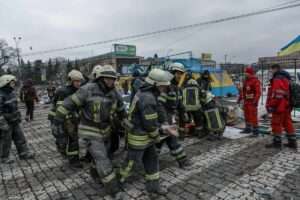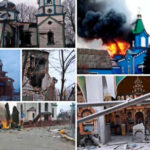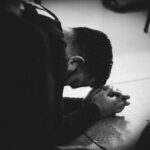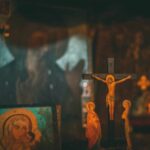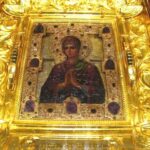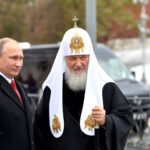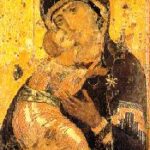The Fishermen as Most Wise
This island smells like fish. The air, the towns, all is infused with centuries of fish catching, eating, and selling. It’s been difficult to find something to eat that isn’t seafood. On my way into town, I approached the lunch counter at the bus station. It was stocked with some of the most delicious Greek dishes, breads, and cheeses. Wanting to keep the fast that day, I looked up at the Greek inscriptions over the counter, trying to decipher ingredients from words that I could read, but not pronounce. Giving up, I asked for something with no meat. In response, I was given a heaping plate of pasta with the most delectable and soft calamari I’ve ever had. While my vision of a meatless dish might be a bit more ascetic than this, you take what you can get.
Something similar happened Friday while taking a break from working in Kolymbari. I walked down the long road from the Orthodox Academy, past the armed guards, into the town in order to find something to eat. I stopped at the first place I saw. A Greek woman approached me, smiling. They were very excited for the Council, and I was their first customer who had stumbled upon them from up the road. I searched the menu for anything fast-friendly, and once again the best I could find was shellfish and pasta. I ordered this, and was surprised to first received two appetizers (which were both fast-friendly of course) before I received my large and scrumptious meal. I felt connected to the island, as I sat on a balcony overlooking the bay, eating mollusks that tasted as if they had just been plucked from the sea. Getting anxious about how much time this was costing me, I finished the meal and was ready to go when the proprietor approached me again and asked if I wanted desert. I declined, being both quite full and a little embarrassed about eating so much. She insisted, saying that it would be a free gift from the restaurant to me. What followed was a delicious chocolate jello of some sort with a full spread of fruit and a bottle of ouzo. The latter item reminded me of the hospitality I encountered on Mt. Athos; a glass of ouzo and a turkish delight at every monastery.
Hospitality is something that I’ve found again and again since my stay here. Its as ubiquitous as fish. For whatever reason, an island of fisherman also happens to be an island of great welcoming.
This morning I watched 10 primates of autocephalous Orthodox Churches gather at the Cathedral of St. Menas in Heraklion to celebrate Pentecost. It was a several hour liturgical marathon, beginning with Orthros, followed by a hierarchical Divine Liturgy celebrated by Ecumenical Patriarch Bartholomew, concluding with the kneeling Vespers of Pentecost. The whole enterprise was as elaborate as the temperature was hot. The reflection of the gold in the room made it seem like even the icons were sweating.
The celebration had its beautiful moments. There was a warm embrace among some of the patriarchs during clerical communion. I was moved by the smiles on their faces. The singing at times was also quite touching. EP Bartholomew, who today was wearing comparatively simple and and unassuming vestments given his rank, has a presence similar to his office. He is a small man with a resounding voice. His chanting was rivaled only by that of Patriarch Theodoros II, whose prayers certainly sound heavenly. But by far, my favorite part of the service was the hymn of Pentecost, "Blessed art Thou, O Christ our God, who hast revealed the fishermen as most wise, having sent upon them the Holy Spirit, and through them Thou hast fished the universe. O Lover of Man, glory to Thee!"
Christ revealed the fishermen as most wise. Christ came into this world as the King of Jews and High Priest and Messiah of the Jewish religion, but instead of exalting the religious leaders or civil authorities, it was the poor and simple fishermen who came out as wise. It wasn't the scribes or pharisees, both of whom were keepers of canon law and among the most educated and brightest of Jewish society. It wasn't the Romans either, or even the native Jewish rulers. It was the fishermen, who often didn't understand his teachings, and even abandoned him.
This wisdom obviously has nothing to do with learning. At Pentecost, the fishermen did not become any more intelligent or any more knowledgeable. Instead, they became more open. It was at Pentecost that the Gospel was preached to the nations, the reviled gentiles who were not canonically permitted to receive the fruits of Jewish sacrifice, these received news of the great sacrifice and resurrection of Christ. The unclean nations were brought into the Christian fold with the sacrament of baptism, an act with roots in the Jewish purification ritual necessary for participation in temple life. The wisdom of the fishermen was hospitality, or philoxenia as it is called in the Greek New Testament. Philoxenia translates as love of stranger, and is the opposite of xenophobia. Pentecost was the overthrowing of centuries of canon law saying who is in and who is out which dates back to Moses, and which was strengthened by the exclusive reforms of Ezra-Nehemiah.
"And through them Thou hast fished the universe," it is this universal vision of Pentecost which Bartholomew has set his sights on, as he made explicit in his sermon today. The love of stranger, of those unlike us, is the essence of the Church, and it is this vision which he hopes the Council will embrace.
Reflecting on the hospitality of the fishermen of Crete I've encountered these past few days has put this vision in a new light for me. On my first full day in town, I had to find my way to Eleftherias Square in order to pick up my badge for the Council. I wandered for several hours, trying to decipher the streets of Chania. Every once in a while, a local fisherman would call out to me and ask where I was going in an attempt to help me. One even walked with me several blocks to get me to my next turn. Eventually, I ended up where Google told me I should be, but alas it was the wrong place. Giving up I approached a cafe and entreated the locals again for help. They sat me down, poured me a cold drink for free, and did everything they could to find my destination. They called the office, googled the address again, and eventually figured out where I was supposed to be. Then one young guy told me to hop on the back of his motorbike so he could take me there directly. Before long I was wondering how I ended up on the back of a motorbike in Crete, speeding through traffic, wearing my finest clothes with no helmet, clutching the large belly of a man whose name I never caught. Even with his help, and the help of several others upon arrival, it still took us another 20 minutes to find the place, but he stayed with me the whole time, and without complaint or reward.
That night I returned to the room I had rented. It is a small room with four beds in it. But when I told the proprietor that I was in town for the Council, he promised me that he would try his best to not book anyone else for my room, so that I could have it to myself. He was a happy man, middle aged and friendly. His cross was visible resting against his Greek fisherman's full chest of hair, peeking out from his open shirt. He smiled while he talked, and when I didn't have an adapter to charge my devices, he gave me one for free. On the drive over to my room, he expressed his great concern that this council might condemn non-Orthodox Christians. He said he realizes that its wrong, even heretical to be outside the Church, but that one cannot be so unkind as to unequivocally condemn. Other Christians need to be shown kindness and we must engage them, otherwise they will never be willing to listen to Orthodoxy or benefit from it.
Again and again I've met fishermen, wise and hospitable, with a universal love. Philanthropos is the term the Pentecost hymn uses to describe Christ. I saw that in the face of one attendant at the airport, who when I told him I was going to Chania for the Council, he looked at me with great joy and eagerness, bordering on tears. He told me that he wanted to help me and that he would do anything for me.
Just a week ago I was at another remarkable place. I was in Toronto, Canada last Sunday at the St. John the Compassionate Mission. St. John's is one of a kind as far as Orthodox communities go. The Mission is open every day of the week, and feeds many poor and homeless. But they are not fed as if they were a soup kitchen, but instead as a Church. There are round tables set up in the narthex where the community comes to eat. The poor eat and work alongside the Christian community, preparing and serving the meals. They live according to the words of St. John Chrysostom, who said in Church there are two tables, one for the poor and one for the altar. The mission is dedicated to St. John the Compassionate, who said "Those whom you call poor and beggars, these I proclaim my masters and helpers, for they and they only are really able to help us and bestow upon us the kingdom of heaven." The poor are our masters is the philosophy of St. John's Mission, and what motivates everything. Or as St. Maximus said, "The poor man is God."
While at St. John's, I sat next to a man named Bill, whose picture is the banner for this article. He is one of the 'Masters' of St. John's. During my visit, he and I sat next to each other at lunch one day, and he told me endless stories of his days as a fisherman. We had only just met, but he was quite enthused to talk with me. He must have learned somewhere the wisdom of philoxenia- something the fishermen of Crete and lake Ontario have in common.
Bless, Master! These were the first words I heard this morning as Orthros began. In light of my recent experiences in Toronto, I found these words jarring. In a recent blog post by Fr. Ted Bobosh, he points out how Bishops weren't referred to as 'Master' until the 14th century. The now common refrain 'Eis polla, eti despota' was originally reserved for the Emperor, but came to be applied to the Bishop as the office was changed through the years. Bishops did not wear the omophorion until the 9th century, for it was a sign of ostentation, and the Bishops crown, the miter, wasn't universally worn until the 17th century. The 'despotism' of the episcopate is something that slowly accumulated as the position of the Bishop become less local and more hierarchical, emulating forms of dress and address that were traditionally associated with secular leadership.
Fr. Ted quotes Fr. Thomas Hopko, who says that 'episkopos' was a term that originally referred to the slave who oversaw other slaves. Fr. Thomas says, "The episkopos, the chief servant, is not the master, the despotis, nor is he king or vasilevs, nor is he lord or kyrios. He is a servant, a slave, a doulos, but he is in charge of everything that belongs to the master and the lord. He is in charge of all the master’s servants, goods, and property. He has all the master’s power and authority. He has everything that belongs to the master. He functions in persona, ‘in the place of’ the master. When you see him, you see the master. When you hear him, you hear the master. When he commands, you hear the command of the master. When he orders you to do something, you obey him as you would the master. But he is not really the master; the real master is the master.”
How strange it was this morning, observing the tremendous Byzantine trappings of a liturgy exalting simply fishermen. Beautiful as it was, there were moments that I found simply perplexing. The ten 'masters,' arrayed in their omophors and great crowns, all seemed to leave the center of attention when President Prokopis Pavlopoulos entered the Church, several hours into the service. The chanting was nearly drowned out by the sound of the military guard stationed outside the Cathedral, which broke into a great march with brass instruments. EP Bartholomew turned around and blessed the President as he walked down the center aisle, just as communion was about to be prepared. A second 'great entrance.'
All throughout this Council, I've been struck by the presence of armed guards around every Church. Security at the Council is as high as the tensions among the Orthodox. The day I flew into Chania, my flight was delayed an hour, and had to circle the airport several times before we were cleared to land, all because the hierarchs were also arriving that day. When we did arrive, we were ushered unceremoniously behind a rusty barricade, while on the other side I could see and hear many soldiers, in uniform, playing fanfare for the arrival of the Bishops.
There is a very official atmosphere here. Press are restricted in what they can do and who they can interview. All the working sessions of the Council are closed. Press releases are very carefully worded and put together. Of course, this Council would be more of a PR disaster than it already is if protections were not in place, so I'm not necessarily complaining. Merely, the atmosphere is different than I imagined a Church Council would be. It was especially funny to see the military procession of the President into the Church of St. Menas this morning, given that St. Menas is himself a military saint who became a conscientious objector, and was eventually martyred for the stance he took against the Roman military and government.
Stranger still was the contrast between St. John the Compassionate, the bishop who called the poor 'Master,' and the poor fishermen of the Church, who now call the bishops 'Master.' There are traditionalist elements in the Church who fear this Council for its ecclesiology. This Council is unprecedented for giving executive power to only the primates of the Churches, and not to the whole body of Bishops. Moreover, each primate has absolute veto power over any of the documents. The fear is that this Council is turning patriarchs into popes, and that EP Bartholomew will benefit the most from this. While I am not as worried about that as those raising these concerns- I have faith in the conciliary identity of the Church and in the sincerity of the episcopate- these concerns do have an element of truth in them. Maybe a global Church does need global leaders like the patriarchs, but this does not mean that we should forget our masters, the poor.
I'm not trying to criticize any individual Bishops here. I haven't actually met any of the primates during my time here; they have more important things to do than to meet me. I assume that behind the Byzantine wall of ceremony, these are good men. Archbishop Anastasios for example, is an advisory board member of In Communion and a friend to the editors. So I have no quarrel with them. Rather, I say all this with hope in mind. If God can make the lowly fishermen 'most wise,' then maybe He can do something with our Bishops too.
It is tempting to criticize this gathering and these men. And perhaps this Council is incomplete. Where are the poor, whom St. Lawrence called 'the treasures of the Church?' Where is Moscow, Bulgaria, Antioch and Georgia? Why are only two women present as official delegates, when there are several hundred delegates and consultants? Why are no autonomous Churches represented, while autonomy remains on the agenda? Why are no married Christians given a vote on the document on marriage? This Council seems anemic in some areas. We might even be tempted to say that this Council is woefully unprepared to 'fish the universe.' Can a message be carried to the whole world by these men, as Bartholomew hopes? In the face of these questions, we should take heart. These men are no more unprepared than the fishermen who first followed Christ two thousand years back. Today, God has revealed the fishermen as most wise. It is the poor, the unequipped, the losers of the world who Christ chooses to use to save the world. So what if under the layer of gold and ceremony, Bishops are sometimes poor in spirit, in faith, in union, in charity, in wisdom? When we look upon the great poverty of our hierarchy, we should take comfort that these poor are our masters.
And who knows, maybe the charity of these Greek fishermen will have some effect while we are all here.
Nicholas Sooy,
contributing editor, In Communion


